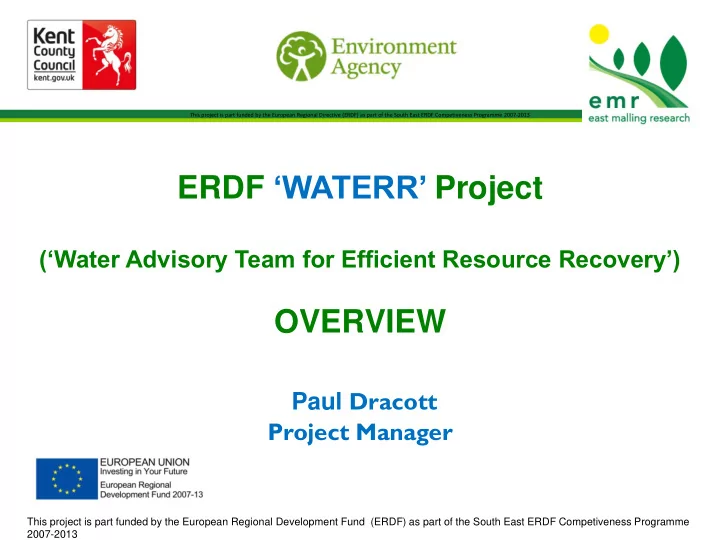

This project is part funded by the European Regional Directive (ERDF) as part of the South East ERDF Competiveness Programme 2007-2013 ERDF ‘WATERR’ Project (‘Water Advisory Team for Efficient Resource Recovery’) OVERVIEW Paul Dracott Project Manager This project is part funded by the European Regional Development Fund (ERDF) as part of the South East ERDF Competiveness Programme 2007-2013
Why the ‘WATERR’ Project is needed (1) Economic Growth / Competitiveness Water is critical to food production / security Food costs have doubled in past 5 years ( FAO) 70% increase in food output needed by 2050 Irrigation accounts for 40% of food production Water productivity (m -3 tonne Class 1 fruit -1 ) Major scope for improvements in water use A) 60-day 140 4-5 fold difference in producer irrigation 120 efficiency (EMR research) 100 Water shortages impacting growers 80 50% affected by lack of water in past 5 60 years (KCC ‘Baseline’ study) 40 Advice on water use efficiency is limited and 20 fragmented (House of Lords Report 2012) 0 3 6 7 8 9 10 13 17 19 20 21 Grower ID
Why the ‘WATERR’ Project is needed (2) Environmental Impact Direct water abstractions Major threat to river / groundwater levels and associated habitats Agriculture / Food Processors Largest users of direct water abstractions (rivers / boreholes) and key ‘tipping point’ in summer months Demand for direct abstractions Already 2x supply in many South East Bewl Water, Kent 19 February 2012 catchment areas Climate Change and increasing population Most South East catchments will be ‘over abstracted’ by 2050 25% increase in agricultural water demand by 2020 (EA)
‘WATERR’ Project Partners’ and Key Stakeholders East Malling Research (Lead Partner) International expertise in horticultural research and water use efficiency, technologies and techniques Environment Agency Local collaboration with abstractors to improve catchment demand / supply balance including new tools for better abstraction management. Kent County Council Rural Task Group involving key stakeholders / experts to support improved water availability, use efficiency and environmental impact. Laurence Gould Leading UK agricultural consultancy and Contractor responsible for Irrigator Interviews, and coordinating Workshops and Demonstrations Other Key Stakeholders : DEFRA, NFU, UKIA, DCLG, Natural England
‘WATERR’ Project Objectives To support South East irrigators to improve their profitability and competitiveness by improving water availability and increasing water use efficiency by 10% by June 2015 Lower water consumption / costs Improved yields Better produce quality / prices Secure business with retailers / processors requiring sustainable production Improved water availability and environmental footprint in South East river catchments
‘WATERR’ Project Businesses supported South East growers and other SME irrigators Soft / Top Fruit Potato, vegetable and salad crops Glasshouse and field production Nurseries Golf course / amenity irrigators Related businesses Irrigation technology suppliers Water management services companies
‘WATERR’ Project ERDF South East Region
‘WATERR’ Project Action plan 1) Evaluate Irrigator Water Availability , Use Efficiency and Support Needs (Dec 2013 to June 2014) Conduct in depth Interviews (‘Irrigation Business Reviews’) with 125 irrigators ( = 25% of South East licenced irrigators) to : Assess Current irrigation water availability and use efficiency Impact on production / yields, pricing and financial returns Identify ‘Best Practice’ technologies and techniques Improvement opportunities / barriers Grower support needs, priorities and Action Plan Confirm ‘WATERR’ Project Support Programme
‘WATERR’ Project Action Plan 2) Direct Support for all South East Irrigators to improve their water availability and irrigation use efficiency (April 2014 to June 2015 ) Workshops to address key support needs identified in the irrigator interviews covering at least 10 South East catchments and 10 key crops Demonstration Visits to see commercial application of leading edge technologies and Best Practice techniques at first hand One to One specialist advice from irrigation experts and access to EMR’s Water Management Demonstration Centre ‘Best Practice’ dissemination via partner websites, including Case Studies, fact sheets , and webinars .
‘WATERR’ Project Irrigator Support Areas / Priorities Understanding how your water use efficiency compares with other growers Guidance on which technologies / techniques have the greatest impact Learning from the experiences of other irrigators , including those in other sectors Options to improve water availability e.g. reservoirs / rainwater harvesting Better collaboration to improve catchment abstraction management Information on latest technologies from leading irrigation equipment suppliers Learning about and influencing planned changes to the abstraction licensing system
Recommend
More recommend